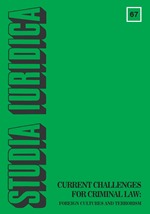LESZEK LERNELL, STANISŁAW BATAWIA I WARSZAWSKA SZKOŁA KRYMINOLOGICZNA W LATACH PIĘĆDZIESIĄTYCH XX WIEKU
LESZEK LERNELL, STANISŁAW BATAWIA AND THE WARSAW SCHOOL OF CRIMINOLOGY IN THE FIFTIES OF THE 20TH CENTURY
Author(s): Michał FajstSubject(s): Law, Constitution, Jurisprudence
Published by: Wydawnictwa Uniwersytetu Warszawskiego
Keywords: Leszek Lernell biografia; Stanisław Batawia; prawo karne; kriminologia; polska szkoła kryminologiczna
Summary/Abstract: The article describes origins of the Warsaw (or Polish) school of clinical criminology – a group of lawyers, sociologists and psychologists co-operating with Stanisław Batawia (1898–1980), a prominent Polish scientist, professor of law and a psychiatrist. He started his scientific career before 1939 and continued it after the war. In first decades of communism in Poland criminology was a forbidden branch of study and was prohibited at universities between 1950 and 1954. At this time only the Marxist theories of crime (regarding a crime as a relic of former regime or as a consequence of a class struggle) were allowed as etiological explanations of crime. The most important advocate of Marxism in legal sciences was Leszek Lernell (1906–1981) – a lawyer, politician and a very influential functionary of the Ministry of Justice. It was him who pressed to abolish criminology as a separate study. However, in the sixties Leszek Lernell changed his mind, apologised for his former activity and became one of most known specialists on the field of criminal policy and criminology. He was also the director of the Department of Criminology at the Warsaw University and the author of many important criminological papers and books. Stanisław Batawia in fifties found a niche for his scientific activity in forensic medicine and psychiatry, but after 1954 he succeeded to rebuild criminology in Poland. He organised the Department of Criminology at the Polish Academy of Science and continued his multidisciplinary study on crime and juvenile delinquency together with his co-workers. Those two scientists personified two ways of doing criminology in modern Poland: the first is concentrated on criminal aetiology and critical analysis of criminal law; the other – on phenomenology and deep multidisciplinary researches.
Journal: Studia Iuridica
- Issue Year: 2006
- Issue No: 46
- Page Range: 61-87
- Page Count: 27
- Language: Polish

